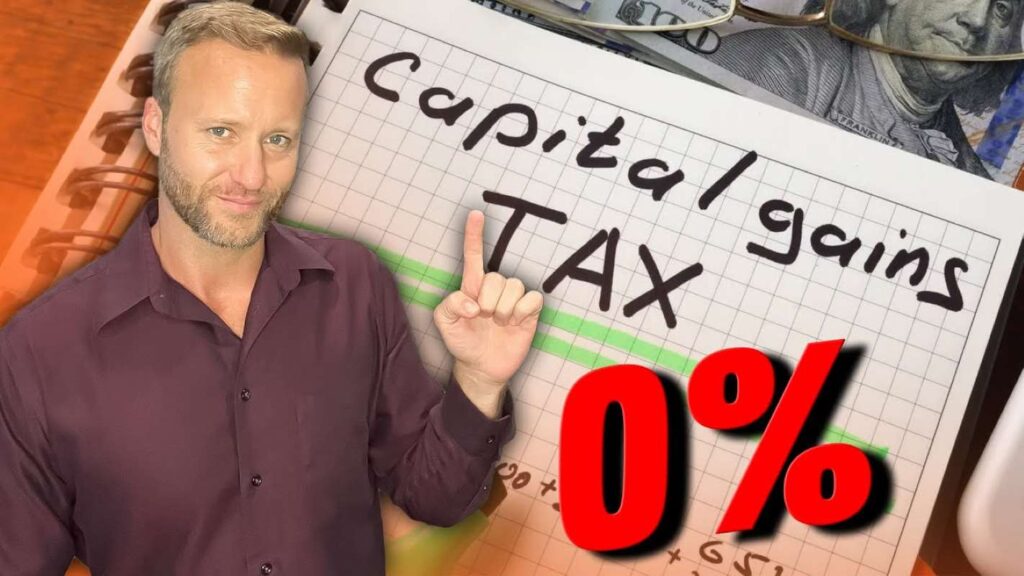Higher crypto taxes are imminent with the recent surge in bitcoin prices. However, investors might sidestep this through a 0% capital gains tax. Experts acknowledge that the tax-gain harvesting tactic is not very common but can be very effective.
However, there is a catch to tax-gain harvesting: crypto investors need to be within the 0% capital gains bracket to enjoy tax reductions. Tax deductions can get cut to zero on your short-term and long-term gains, depending on the tax reporting requirement for your income class.
Leveraging the 0% Capital Gains Bracket with Tax-Gain Harvesting
Tax-gain harvesting involves selling your digital assets in low-income years. Doing this will help you sell your profitable crypto at very low tax rates or even at 0%. Let’s briefly explain how this works.
Tax on crypto assets is not charged based on the asset’s value but on the income it generates. However, during a low-income year, selling crypto like bitcoin, with high asset appreciation, is still possible with a capital gains tax rate as low as 0%. The implication is that the summation of all income and investment profit may lighten your tax liability. Real estate profits, investment income, and long-term capital gains all come under the niche of your estimated income.

Once again, the caveat is that your gross earnings must fall within the 0% capital gains tax bracket. That simply means you enjoy a tax exemption when your income falls within the said tax bracket. In addition, this rule is only valid for assets that have been held for over a year. Consequently, short-term gains cannot be lumped under the tax-exempt bracket.
ALSO READ: Harris Proposes 28% Capital Gains Tax, Lowering Biden’s Initial 40% Plan
Calculating Taxable Income and Qualifying for the 0% Bracket
According to a certified public accountant and tax attorney, Andrew Gordon, exploiting the 0% capital gains tax is a “very effective strategy if you’re in that bracket.” However, enjoying this tax loophole may be impossible without knowing the applicable income limits for 0% capital gains. So, let’s see if you qualify for some of those 0% rates.

.The benchmark changes whenever the Federal Reserve and Internal Revenue Service modify tax policies. However, for 2024, it would take an annual income of $47,025 or less for a single person to qualify for tax exemption. If you’re married, the income limit rises to $94,050 for a joint tax filing.
However, the capital gains tax bracket is bound to increase in 2025, as announced by the IRS this October. The tax harvesting agency explained that the changes are largely inflationary adjustments. So, the implication is that you can still enjoy tax exemption even with a gross income higher than the figures quoted above.
Simply subtract statutory tax deductions from adjusted gross income to calculate your taxable income. However, taxable income must include digital asset appreciation, outright sale proceeds, and even real estate profits.
How Tax-Gain Harvesting Can Reset Your Crypto Cost Basis
Resetting your crypto cost basis is possible using the 0% capital gains bracket. According to Matt Metras, the owner of MDM Financial Services, selling profitable crypto within the 0% bracket should not attract tax.
Considerations for Repurchasing Crypto After Harvesting Gains
In addition, Metras suggests repurchasing crypto assets shortly after selling them for a harvest gain, which is also beneficial in the 0% tax bracket. However, running a tax projection upfront is essential to ensure the transaction does not take out of the capital gain bracket.
The Impact of Rising Bitcoin Prices and Market Conditions
Last month, thanks to a Bitcoin price rally, the crypto asset went to an all-time high of $90,000. Interestingly, the bitcoin price surge does not seem to be waning. As of Monday afternoon, the price of bitcoin climbed to a new record of $93,000, in tandem with pre-election predictions.

It is difficult to predict if this increase in bitcoin price will be sustained in the future. However, investors and some Wall Street analysts anticipate even more investment income on crypto assets after Donald Trump’s reelection. This optimism is premised on the President-elect’s promise to back pro-crypto policies during his second term in office.
ALSO READ: Bitcoin Surges Past $82,000 Amid Trump-Driven Crypto Rally, Is $100K Next? It takes a sound understanding of the taxation system to evade crypto tax liability. As discussed earlier, low-income years are periods of reverses but can be a plus for investors. You can get to pay zero tax on income sources like real estate profits and other long-term gains. However, single and married folks should take note of tax reporting requirements before proceeding on their tax-gain harvesting adventure.

